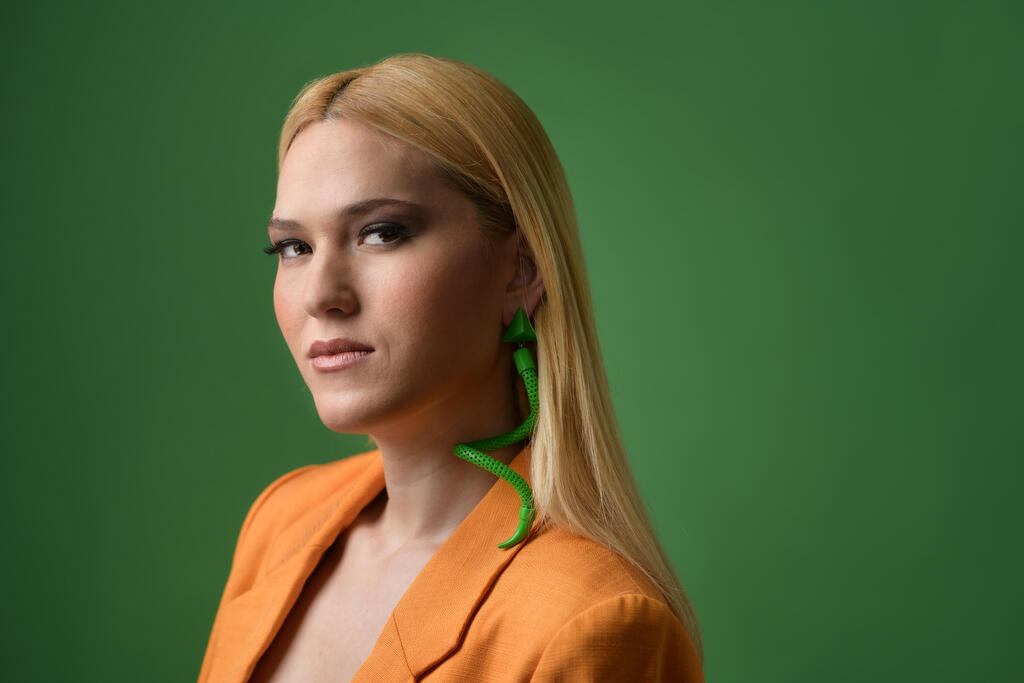Usually, people who upload cover songs of themselves to YouTube wake up the next day with 16 views at best, however, that's not the case with Israeli singer Noy Meirson.
Other stories:
When she woke up one day, Meirson discovered that she had the most listened-to song in the Democratic Republic of Congo, of all places.
"I recorded a cover of Bob Marley's 'Redemption Song' and uploaded it to YouTube. And all of a sudden I started receiving a lot of messages on Facebook and Instagram from Congo," she recounts.
"They wrote to me, 'Wow, we love your song.' I asked them, 'How did you even find it?' and they sent me a photo of their TV showing the song in the top ten of the music charts there. They contacted me to set up interviews on TV and radio shows. And the younger people in Congo even believed it was actually my song. I could only wish," Meirson explained.
When did you realize the magnitude of the buzz around you?
"When I flew there for an interview. I landed at the airport in Kinshasa with my parents and suddenly there were a lot of paparazzi, journalists, and fans in the hall shouting my way, 'I love you, Noy!' I knew that I was going to be interviewed on various programs and in newspapers, but I didn't think it would be to this extent.
They recognized me in restaurants, in the market, and everywhere, and asked for selfies. The people who invited me to the interview even arranged security for me at the hotel. I knew there was interest, but I never imagined I wouldn't be able to walk on the street. And all this because of one song, which was only a cover."
And out of all places, it happened in Africa, specifically in Congo.
"In Congo, there are 100 million residents, 26 million in the capital city. On that first visit to Congo, I also went to villages around and met with a small tribe. Someone recognized me and started singing the song to me.
They don't have electricity, they don't have radios, they don't have televisions, and it's not a place that has access to consume culture and music. It was an hour's drive away from the relatively developed city center, they lived in mud huts that they built by themselves. They completely live off the grid, and yet they recognized me."
Meirson, 30, was born in Haifa and lives on the Tel Aviv-Paris-Congo axis. She became familiar with the iconic Bob Marley song, which she recorded six years ago, through dealing with the trauma during her IDF service.
"I believe that this song by Bob Marley is a song of redemption, which took me to one of my most personal memories. There are times when I am drawn to redemption. I went through rape when I was a soldier. It was a difficult betrayal of trust because it was someone very close to me. It affected me terribly. I can't elaborate beyond that because I'm in the midst of a legal process in court. I take inspiration and healing from it by writing and creating music. And it's a tool that helps me cope with the trauma itself, it frees me. I receive many messages from people that my music helps them move on."
What did you learn about their culture?
"Dancing is a significant part of their culture. I released a song called "Nionso" with some words I learned there and in collaboration with a local artist. In every music video, there is a traditional Congolese dance, which consists of hip movements. I started performing at festivals, and there was a big show in front of 13,000 people at an event they did with Coca-Cola. My music even reached Cameroon, Senegal, Ivory Coast, Mali, and Gabon."
It's crazy.
"I had a flight back from Congo, and there was an athletics team on the plane. The whole team approached my seat and started singing the song. I started crying. Here and there, I also receive marriage proposals from Congolese on Facebook."
Strangers are not always welcomed by the Congolese. Some of them are jealous of their traditional music. Have you experienced it?
"After 'Nionso' was released, I received death threats in Congo. I was supposed to perform and a few hours before that, I received a Facebook message from someone who seemed local that if I come to this concert, they will kill me. He wrote, 'We know you have a performance today, if you perform, we will kill you.' And after that, I received more messages from his friends who wrote the same thing.
It was terribly frightening, I forwarded the messages to the ones who invited me to perform and they passed it to the authorities in the country. They contacted me afterward and said they had taken care of it. They made sure I could arrive at the performance. To this day, I don't know what happened there, who they were, and how it got to the level of threatening someone's life."
And why, because you are not one of them or because you are Israeli?
"I do believe it's because I'm different. In interviews and with people I met on the street, I felt very confident and received a lot of love, but in the incident with these people, I felt like there was a group of individuals who didn't like me.
Everywhere, even in Africa and in France, they know I'm Israeli. In articles, the word 'Israeli' sometimes comes before my name. In Congo specifically, there are a lot of Christians and Muslims, but I don't know if it's related to where I came from or because I'm Jewish. I was happy they reported to me that it was over and done with."




